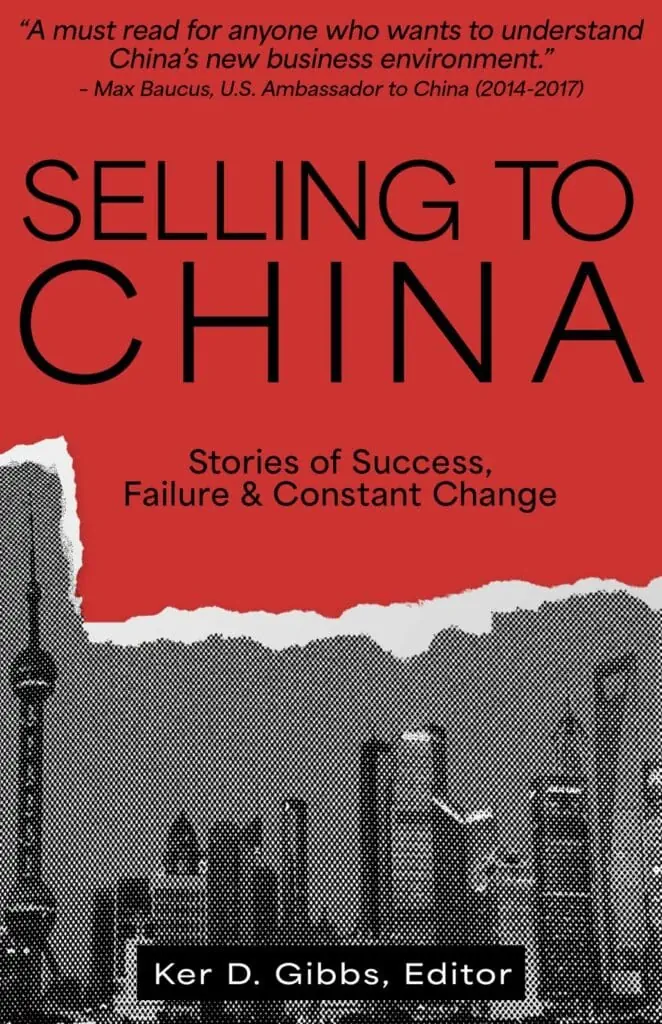A new book brings together senior executives from Chrysler, 3M, Education First and law firm Hogan Lovells to discuss how global companies can adapt to doing business in China without compromising their values or sacrificing their interests
Ker Gibbs was president of the American Chamber of Commerce in Shanghai for many years, focusing on US-China relations and business issues facing American companies operating in Asia. Before that, he worked for a number of large US corporations in China, including Boston Consulting Group, Apple and Disney, and also advised Chinese companies such as Alibaba and Baidu. Currently, he is an Executive in Residence at the University of San Francisco and is a member of the National Committee on US-China Relations.
Now, Ker has edited a collection of essays on doing business in China – a collection that often demonstrates that it is the business community that currently understands China best in this time of tensions between Beijing and the West. Selling to China: Stories of Success, Failure and Constant Change brings together a host of US and Chinese experts to discuss various sectors – from legal to social media, sports to logistics. Expert contributors include senior executives from Wunderman, Procon Pacific, Chrysler, 3M, EF Education First in China and law firm Hogan Lovells.
Paul French caught up with Ker to discuss why businesspeople can be great diplomats, how business can cut through the current tensions, and where the commercial world of China might be in the future.
You say the US and China seem headed for conflict. Do you think there’s a way to improve relations? And is business and trade where that process starts?
There’s a path forward to better relations, but it’s going to require compromise and understanding on both sides.
We wrote this book partly to show that global businesses have found ways to adapt without compromising our values or sacrificing our interests. They will continue to play a role as long as they can do so legally and ethically and aren’t prevented from doing so by national security concerns in Beijing and Washington. Large foreign businesses have found ways to operate within the Chinese system and been successful. There could be useful lessons here for how other governments interact with China. In China, the relationship between government and business is very different from the West, and this is a common source of misunderstanding both at the policy and business operations levels.
Our book offers a nuanced explanation of that unique dynamic, which is a common cause of failure for China CEOs if they don’t appreciate how these relationships work. The CEO role in China is often mainly about government relations. I’ve seen many new leaders fail in China because they didn’t realise this or didn’t know how to properly manage relationships with government officials in China.
You’ve chosen your contributors carefully and seem to suggest that policymakers and company boards would do well to listen to practitioners. What is it about people actually doing business — at the coal face, so to speak — that makes them better interpreters of the pluses rather than the minuses in China’s relationships with the outside world?
As a general rule, it’s wise to listen to people with on-the-ground experience. China isn’t unique in that regard. People who have run large businesses in China understand the workings of the system in a way that’s different from the way Western government officials look at the situation. For one thing, the practitioners have actually lived in China. It’s impossible to develop a nuanced understanding of any place or culture without spending time actually living there and making active efforts to understand what’s going on.
Second, business practitioners have experienced the ways in which the Chinese system effectively achieves results here in China, even if that approach may not work for us in the West. Just look at how China has built out its infrastructure projects in such a short period of time. In China, the government has tremendous authority and can make decisions without undergoing the kind of lengthy reviews and compromises that Western democracies would demand. But for China, the system works. That doesn’t mean we advocate adopting China’s system of governance, but it does mean that business people take a practical approach to learning and picking out ideas that seem to work. It might be beneficial for governments to listen to what the foreign business community has learned about how China works in reality.
A number of your experts are Chinese rather than American or European, reflecting greater localisation, exposure of Chinese businesspeople to the outside world, and the necessities of the Covid-19 pandemic. The localisation debate continues with pro and anti opinions. Do you think Western business still has a way to go on localisation or have we reached the peak?
In my opinion, we’ve gone too far with localisation. There are very few foreigners at all working in most American businesses in China, and my sense is that European businesses are also heading in the direction of relying on Chinese talent for senior positions, either returnees or entirely local. This further silos the China business units at a time when both governments are pulling us apart anyway. If we can localise business practices – meaning adjust to local tastes and trends and work effectively within the local system – but keep a healthy mix of Chinese and Western managers, then we could have the best of both. This is hard to do, and I’m seeing China operations become more isolated from headquarters. Our book is an effort to close that gap, making more operational knowledge about business in China available to readers.
You say that many businesspeople are hesitant to say anything at all about China due to worries of censorship or some sort of economic punishment. Do you think this self-censorship is significantly worse than before, and is it going to become a long-term problem for foreign businesses if they can’t speak truth to power?
It’s a significantly worse problem now, in part because expectations have changed, and there is a much higher degree of sensitivity about certain issues, such as Hong Kong, Taiwan and Xinjiang. I came to China in the mid-1980s, when there was no expectation that people could speak their minds. China had been completely closed off from the West for decades and there was still nervousness about interactions between Chinese and Western people. China was coming out of a long period of isolation, and we understood that the process was going to take time. All that changed in the decades that followed, and we became accustomed to speaking to each other quite candidly, while still respecting certain boundaries here in China.
Now we’re going through a new period of change. In the West, attitudes toward China have become quite sharp and ideological. No one is interested in nuance. That makes it riskier to express views that may not align with mainstream views about China. People from the business community are practical and apolitical, so they are generally cautious about assuming that risk. There’s good and bad in China, as anywhere else, but there is little interest in hearing about the good. Those of us who still favour engagement with China are having a more difficult time being heard. To be clear, none of us are saying that national security issues don’t exist; we are just saying that disengagement with China may not be the best way to address those problems in the long term.
You talk about American businesses going ‘asset light’. Can you explain what you mean by that?
The tension between China and the West has reached such a level that corporate boards cannot ignore the possibility of a catastrophic event. Nobody wants that, but it would be irresponsible not to have a plan, whether it’s de-risking supply chains, relocating employees, or considering what assets would need to be written off if something were to happen.
Russia’s attack on Ukraine resulted in companies not just shutting down businesses, but abandoning hard assets in Russia, which in some cases meant writing billions of dollars off their balance sheets. The boards of companies with those kinds of hard assets – plants and equipment that can’t be moved – are asking what adjustments can be made now that would reduce the impact on their business later, if such an event were to take place. An extreme example of going “asset light” would be to sell a wholly owned subsidiary and convert it to a JV or licensee. That keeps the business operating in the market but takes assets off the balance sheet.
You seem generally upbeat about many things that used to depress and annoy foreign businesses in China – consumer resistance to price, IP theft, etc. Even with all the political tensions right now, where do you see the general relationship between China and the West in, say, five years?
The point we are trying to make in the book is that business problems are solvable, and the West and China can have a mutually beneficial economic relationship. The China market has changed dramatically, and in some ways, is even more challenging than it was when there was low-hanging fruit to pick. If IP theft and copycats are less of a problem, they have been replaced by legitimate competition from local players with vastly improved capabilities. This level of competition will intensify, but that’s not necessarily bad. As long as the competition is fair and legal, then industries become stronger, and consumers win. But we’re at a turning point here. Governments on all sides need to cooperate to find a path to peaceful coexistence, but in order to do that, we should give up trying to convert each other ideologically. We need to think tactically about what each side can give up and live without, in order to enjoy gains in other areas. The way we’re headed isn’t working, and it’s becoming more and more dangerous. Both sides need to rethink their approach if we are to have any relationship at all in the next five years.





